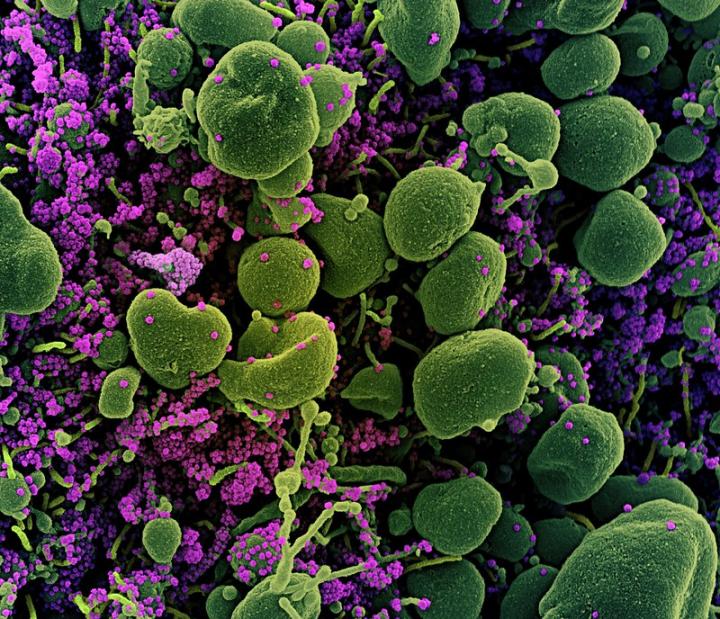
IMAGE: Colorized scanning electron micrograph of an apoptotic cell (green) heavily infected with SARS-COV-2 virus particles (purple), isolated from a patient sample. Image captured at the NIAID Integrated Research Facility (IRF)…
view more
Credit: NIAID
WHAT:
An investigational vaccine, mRNA-1273, designed to protect against SARS-CoV-2, the virus that causes coronavirus disease 2019 (COVID-19), was generally well tolerated and prompted neutralizing antibody activity in healthy adults, according to interim results published online today in The New England Journal of Medicine. The ongoing Phase 1 trial is supported by the National Institute of Allergy and Infectious Diseases (NIAID), part of the National Institutes of Health. The experimental vaccine is being co-developed by researchers at NIAID and at Moderna, Inc. of Cambridge, Massachusetts. Manufactured by Moderna, mRNA-1273 is designed to induce neutralizing antibodies directed at a portion of the coronavirus “spike” protein, which the virus uses to bind to and enter human cells.
The trial was led by Lisa A. Jackson, M.D., MPH, of Kaiser Permanente Washington Health Research Institute in Seattle, where the first participant received the candidate vaccine on March 16. This interim report details the initial findings from the first 45 participants ages 18 to 55 years enrolled at the study sites in Seattle and at Emory University in Atlanta. Three groups of 15 participants received two intramuscular injections, 28 days apart, of either 25, 100 or 250 micrograms (mcg) of the investigational vaccine. All the participants received one injection; 42 received both scheduled injections.
In April, the trial was expanded to enroll adults older than age 55 years; it now has 120 participants. However, the newly published results cover the 18 to 55-year age group only.
Regarding safety, no serious adverse events were reported. More than half of the participants reported fatigue, headache, chills, myalgia or pain at the injection site. Systemic adverse events were more common following the second vaccination and in those who received the highest vaccine dose. Data on side effects and immune responses at various vaccine dosages informed the doses used or planned for use in the Phase 2 and 3 clinical trials of the investigational vaccine.
The interim analysis includes results of tests measuring levels of vaccine-induced neutralizing activity through day 43 after the second injection. Two doses of vaccine prompted high levels of neutralizing antibody activity that were above the average values seen in convalescent sera obtained from persons with confirmed COVID-19 disease.
A Phase 2 clinical trial of mRNA-1273, sponsored by Moderna, began enrollment in late May. Plans are underway to launch a Phase 3 efficacy trial in July 2020.
###
Additional information about the Phase 1 clinical trial design is available at ClinicalTrials.gov using the identifier NCT04283461. This trial was supported in part by the NIAID grants UM1AI148373 (Kaiser Permanente Washington), UM1AI148576 (Emory University) and UM1AI148684 (Infectious Diseases Clinical Research Consortium). Funding for the manufacture of mRNA-1273 Phase 1 material was provided by the Coalition for Epidemic Preparedness Innovations (CEPI).
ARTICLE:
LA Jackson et al. A SARS-CoV-2 mRNA vaccine–preliminary report. The New England Journal of Medicine. DOI: 10.1056/NEJMoa2022483 (2020).
WHO:
NIAID Director Anthony S. Fauci, M.D., and John Beigel, M.D., associate director for clinical research, Division of Microbiology and Infectious Diseases, NIAID, are available to discuss the results of this trial.
CONTACT:
To schedule interviews, please contact Anne A. Oplinger, (301) 402-1663, niaidnews@niaid.nih.gov.
NIAID conducts and supports research–at NIH, throughout the United States, and worldwide–to study the causes of infectious and immune-mediated diseases, and to develop better means of preventing, diagnosing and treating these illnesses. News releases, fact sheets and other NIAID-related materials are available on the NIAID website.
About the National Institutes of Health (NIH): NIH, the nation’s medical research agency, includes 27 Institutes and Centers and is a component of the U.S. Department of Health and Human Services. NIH is the primary federal agency conducting and supporting basic, clinical, and translational medical research, and is investigating the causes, treatments, and cures for both common and rare diseases. For more information about NIH and its programs, visit http://www.
NIH…Turning Discovery Into Health®
TDnews














